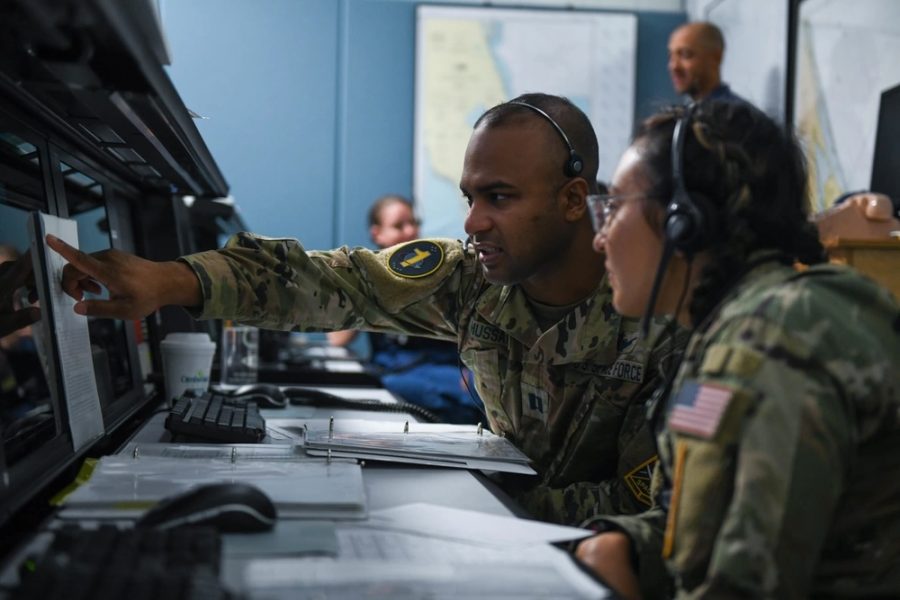The Space Force is still working out when Guardians will officially be able to work part-time under a new law that does away with “regular” and “reserve” members in favor of a combined full-time and part-time system.
Signed into law last month as part of the 2024 National Defense Authorization Act, the Space Force Personnel Management Act integrates Active-Duty Guardians with Air Force Reservists who serve in space-focused career fields “into a unified service that offers both full-and part-time service options,” Space Force spokesperson Maj. Tanya Downsworth told Air & Space Forces Magazine.
The service hopes the new system will help manage its force more effectively, improve quality of life and retention, and tap into skill sets that many reserve component service members develop in their civilian jobs. The law comes after a 2023 RAND report that described service members running into frustrations with finances and benefits when moving between regular and reserve work.
Those barriers are not unique to the Space Force, but removing them is one of several reforms the service is pursuing as it aims to attract and retain top talent in a competitive marketplace.
“The overarching goals of a seamless full-time and part-time workforce are to create a flexible workforce that improves linking individuals to need, creates a more modern military workforce structure, and, in doing so, better serves the desires of individual members without negatively affecting mission accomplishment,” the RAND report stated.
Under the new construct, Guardians will be either on sustained duty orders (a full-time position with subsequent full-time positions throughout their career) or not on sustained duty (serving in a part-time position). According to the NDAA, Guardians not on sustained duty would participate in at least 48 scheduled drills or training periods a year and serve on active duty for at least 14 days a year, or, alternatively, serve on active duty for training for no more than 30 days a year.
There will also be an inactive duty status, similar to the Individual Ready Reserve in other branches. However, it could be a while before the Space Force works out when the new structures take effect.
“We are still in the nascent phases of planning and implementation and do not have details at this time,” Downsworth told Air & Space Forces Magazine when asked when Guardians will be able to switch between “sustained” duty and “not on sustained duty.”
The service is working with the Air Force Reserve to develop a phased implementation of the Space Force Personnel Management Act “across the next few years,” she said. The phases are:
- planning
- initial transition
- majority transition
- final transition
Working groups began the planning phase months ago and are now starting the initial transition phase.
“We will remain as clear and transparent with the force as possible as more details become available,” Downsworth added. “All transfers from the Air Force Reserve will be voluntary.”
Though the concept is still in the initial transition phase, the pay, benefits, duty status, and retirement calculations of part-time Guardians could look the same as they do for Air Force Reservists today, Downsworth said. The same could be true for full-time Guardians who today are Active-Duty Guardians.
Guardians on Guard
A separate section of the NDAA calls for a study of space functions in the National Guard. Due March 1, the study will look into the feasibility of leaving National Guard space-focused units in place, transferring those units to the Space Force, or transferring them to a new Space National Guard.
Proponents of a Space Guard argue that Guard units performing space missions will be “orphaned” until the issue is resolved, and that the Guard’s unique state-level humanitarian and disaster relief missions are a key recruiting draw. But critics say a Space Guard would be too small to justify the extra bureaucracy and that the inherently global mission of space would make them ill-suited for local disaster response.
For its part, the Space Force “is excited for the outcome of the feasibility study as we drive toward a solution that ensures unity of command over space forces in this complex threat environment,” Downsworth said.
Downsworth said implementation of the Space Force Personnel Management Act is independent from the Guard, as SFPMA focuses on bringing together active Guardians and Air Force Reservists who perform space jobs into a unified service.
“This enhances the Space Force’s ability to fulfill our mission as a warfighting domain by eliminating bureaucracy and providing operational flexibility; creating a common culture and training environment; and offering a new model for talent management,” she said.


